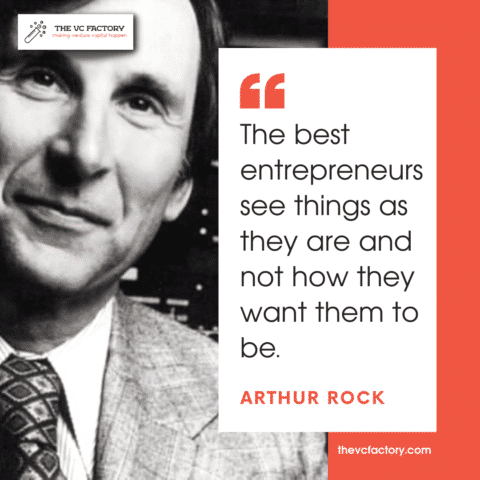“The best entrepreneurs see things as they are and not how they want them to be.” – Arthur Rock

We’re continuing our series on quotes from legendary VCs, and this week we’re going straight to the source. It’s hard to find a more blue-blooded VC than Arthur Rock.
A decade before Don Valentine founded Sequoia Capital and Eugene Kleiner and Tom Perkins founded Kleiner Perkins, there was Davis & Rock, Arthur Rock’s venture capital firm. In those days, institutions such as pension funds were not allowed to allocate capital to VC firms, so Rock had to convince a dozen business relations and clients to invest the $5 million he needed for his first fund.
Arthur Rock’s name is synonymous with Silicon Valley. He’s the broker behind Fairchild Semiconductor’s financing and contributed to the growth of early Silicon Valley successes such as Intel (where he was a director for over 30 years), Scientific Data Sytems, Teledyne, and Apple.
Building People—And Companies—First
Rock, who’s now 95 years old, was the guest of an event held in 2007 at the Computer History Museum in Mountain View. Fortunately for us, the conversation was recorded and transcripted.
It’s clear throughout the exchange that’s Rock’s primary focus at the time was on people and building companies more than making money.
It didn’t start like that, however. When he helped the group later known as the “Traitorous Eight” (which included the two Founders of Intel), Arthur Rock acted as a Wall Street investment banker. His calling as a Venture Capitalist came a few years later.
He would also test whether they were intellectually honest, seeing things how they are, not “promoters” for whom making deals would be more important than building companies. Arthur Rock was very critical of the excesses of the Internet Bubble of the late 1990s.
I’m curious about what he would say today.
Are Entrepreneurs Delusional?
One of the primary personality traits I repeatedly observed over the years in entrepreneurs, both successful and unsuccessful, was a tendency to live in denial. Of not seeing things as they were, to paraphrase Arthur Rock.
I vividly remember a story over a decade old, but that stuck with me until now, and no doubt prodded me into embarking on my doctoral work on the psychology of entrepreneurs. I was helping out a fintech entrepreneur who had not succeeded in raising funds due to an oversized funding ask. (I talk about it in more detail in my webinar: Don’t Ask Venture Capitalists Too Much Money – Here’s How To Size Your Funding Round.)
So many stress factors would petrify any “normal” person. It would have been much easier to give up and fold the company rather than trying to salvage any value and secure jobs for all his employees.
Maybe it was sheer grit, pride, or a sense of duty. Still, the Founder kept pushing, and we ended up finding an arrangement with a prominent market player who believed in the product and agreed to acquire the startup and inject cash to develop it.
At the time, I believed what had saved the entrepreneur was his ability not to see things as they were. His capacity to deny what was objectively a scary situation eventually proved advantageous.
One predominant explanation for entrepreneurs’ optimism is overconfidence in their knowledge, ability to predict the future, and general personal abilities.
Barbosa, Fayolle, & Smith (2019)
With the benefit of my research these past two years, I now believe there is another psychological dimension to consider: overconfidence.
Overconfidence, The Entrepreneurs’ Double-Edged Sword
Overconfidence is the belief you will succeed where others fail. It partly relies on a personality trait called self-efficacy: the perception that you will successfully perform a task given your core competencies.
Entrepreneurs have long been diagnosed with both high overconfidence and self-efficacy.
The negative aspect is that they are prone to mistakes such as entering the wrong market or believing there is a market when there is, in fact, none. (Lack of a market is a primary cause of startup death.)
I would argue that overconfidence is even more important than risk appetite in entrepreneurs. The perception of risk in the entrepreneurial context is relative.
Overconfidence vs. Risk: AirBnB
When he set out to form AirBnB (then called AirbedAndBreakfast) with his co-Founders, Brian Chesky didn’t appreciate the risk level of his new venture like others around him did.
He famously pitched dozens of Venture Capitalists to sell them the idea that arranging for people to host total strangers in their homes was not a crazy idea fueled by ingenuity and delusion. Fred Wilson, the legendary VC based in New York, openly wrote about it and let Y Combinator’s Paul Graham publish their email exchange about why he eventually declined to invest.
(These are fascinating forays into the VC’s decision process. Watch my webinar, The 7 Secret Evaluation Criteria Venture Capitalists Use To Make Investment Decisions, for more on that topic).
I thought someone would get raped or murdered and the blood would be on their hands. Airbnb is a $10 billion company I’m not an Investor in.
Chris Sacca (source: Startup)
Other savvy Investors, such as Chris Sacca, passed on the deal. The interesting point here is that the Founding Team appreciated the venture’s risks very differently.
Brian Chesky recently shared that the main risk most people warned him against was trust. “Strangers will never trust another.” But he was confident that it was possible to design a system for strangers to trust one another, as he recalls.
This point of view perfectly illustrates how overconfidence influences risk.
Naturally, other considerations need to be taken into account, such as cognitive biases. Chesky points out that he and his teammates believed people are fundamentally good, a prior heuristic that fueled their desire to build a robust trust system.
“The Worst Idea That Ever Worked”
In a 2015 exchange with Reid Hoffman at Stanford, Chesky relates AirBnB’s early days. The whole video is a must-watch for budding entrepreneurs (and, I would argue, Investors willing to understand the company-creation process). Chesky repeatedly highlights the idea that overconfidence overcomes risk.
Talking about how Airbnb designed the payment system, he reminds the audience that there was no platform at the time where people would pay other people directly. eBay and Etsy both relied on PayPal (whose first VP, Reid Hoffman, is sitting right next to Chesky).
And that was kind of a scary idea. It almost scared us. We decided, let’s just do it.
Brian Chesky
Delusion? Ingenuity? A complete disregard for consequences? I believe most entrepreneurs take on challenges because their self-belief considerably diminishes their perception of the risks involved.
They see things not as they are but as they want them to be.
